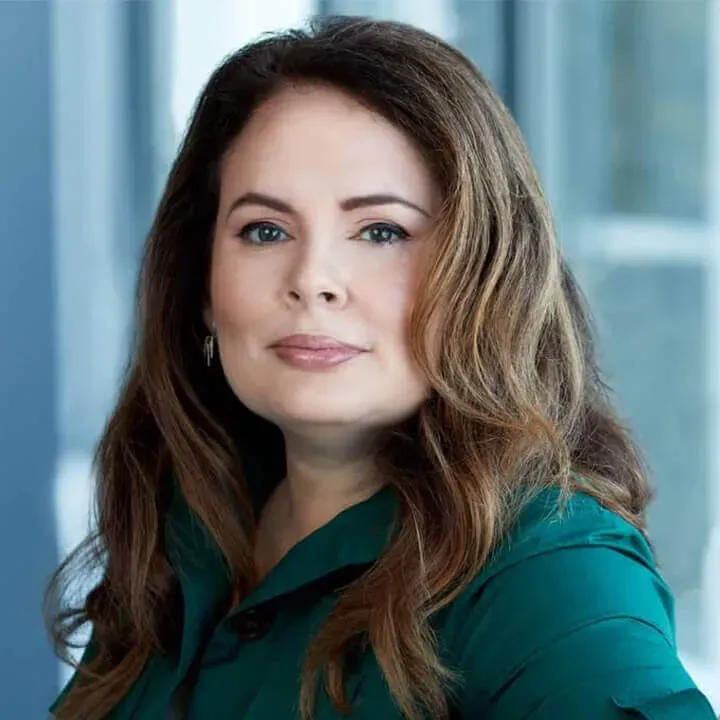When Jessica Rodriguez came to Stanford GSB, she had one goal: to work at Univision, America’s largest Spanish-language media company. That clarity of purpose impressed Catherine Rivera and Sebastian Velez, current copresidents of the school’s Hispanic Business Students Association, and the people who nominated her for the group’s Jerry I. Porras Latino Leadership Award, which she will receive in March.
“Most of us come to business school unsure of what we want to do or don’t stick to a particular path,” Velez said. “There’s something to be said for that hustle that allows you to know what you want and go for it.”
Rodriguez started at Univision as a summer intern in 2000. Nearly two decades later, she is chief marketing officer for the company, as well as president and chief operating officer of its television network division. The company has nearly $3 billion in annual revenue, and its programming reaches more than 100 million consumers each month.
Rodriguez also volunteers with the Ballet Hispánico and the Girl Scouts of New York and was active in relief efforts in Puerto Rico after Hurricane Maria. “She reflects the voice of the community,” Rivera says.
Where did your single-minded vision of working at Univision come from?
I grew up in the South Bronx, and my parents were immigrants from Puerto Rico and Spain. Watching television was a way of escaping the inner city. It was also a way of relating to my parents — we would watch soccer, telenovelas, and Spanish-language news. I wanted to work for a company that brought so much joy into people’s homes. But realism set in. I was the first in my family to go to college, and then my dad passed away. I decided to go into investment banking. One of the managing directors of the bank was the first person who encouraged me to pursue my career passions.
How did you make your dream a reality?
In my first year at Stanford GSB, a president of Univision spoke at an event on campus. Afterward, I presented myself to him, dressed up and with my resume in hand, and told him I wanted to work there. He said, “If you fly yourself out to Los Angeles, I’ll know you’re serious.” So I did, even though I was broke. When we met, he pointed out that I didn’t have a background in media. I told him, “All I know is that if you hire me, you are never ever going to regret it.” It was the first time they created a summer internship for an MBA. The rest is history.
In your company photo, you’re wearing a magenta dress against a pink backdrop. All the other executives are in black or gray against a drab background. What is the right balance of standing out versus fitting in when it comes to success in the corporate world?
As a first-generation Latina, I’ve always struggled with identity because I straddle two cultures. Growing up, it was always about fitting in. Being a young investment analyst was all about conforming. In the corporate world, when you deliver results, there’s room to show who you are, and people gravitate toward that. We work 18-hour days — if we’re not at the office, we’re connected. At some point you have to unmask. For me, that’s bringing color, creativity, joy. I love leaning into my femininity in the workplace. Obviously, you need self-awareness to understand when to bring out certain pieces of yourself.
Women still fill less than a quarter of the board seats at Fortune 500 companies, and minority women make up less than 5%. What advice do you have for women, especially women of color, who want to ascend the corporate ladder? And what’s holding them back?
Organizations need to work on flexibility. Women continue to bear the brunt of the housework and raising kids, and many drop out when they feel they have to choose between work and home. There are structural issues around daycare, school hours, and vacation times. My advice is, first, understand that your voice matters. The United States is going to be a minority-majority country by 2045, so our perspective is needed at all levels. Second, raise your hand. Take every opportunity. Sometimes you can fall into the trap of looking for the most high-profile job, but that’s not always the one where you learn the most. Finally, I tell women that they own their careers. A lot of us expect someone to come to us with opportunities, but it’s important to remember that everyone else is busy and stressed. Ask yourself, “Where do I want to be in three or five years?” You have to make the magic happen.
Have you encountered failures along the way?
Six years ago, I was demoted. I had spent 12 years at the company, had wonderful reviews, and was on the fast track. Then one day, I was no longer reporting to the president of entertainment but to the head of programming. I was dejected, because I’d never had a setback in my career. I wondered whether it was time for me to leave.
How did you bounce back?
Eventually, I realized that it wasn’t about me, but about what was happening in the business, and I had an honest conversation with my new boss. When you’re disappointed and sad, have a moment with it, but don’t unpack and make a home there. Move on, because there’s work to do.
What do you see as the role of Univision in the Trump era?
Our mission is to inform and empower our audience. We haven’t shied away from advocating for the Latino population, whether that’s getting out the vote or covering events in Puerto Rico and Venezuela. Our 120-plus local radio and TV stations often get calls about things like becoming a citizen. We advocated for children detained on the border from a humanitarian perspective. But the Latino population is not monolithic — there’s a diversity of beliefs and ideologies.
Should a company like Univision take a stance on social and political issues?
Savvy consumers today want to feel that the brands they engage with stand for their values. But companies have to be careful about not stretching too far into something that isn’t core to their brand. For us, everything falls through the lens of empowering, informing, and entertaining Hispanic audiences.
Were there any professors or courses from your time at Stanford GSB that you found particularly helpful, and whose lessons still resonate today?
Jennifer Aaker’s marketing class, Michael L. Ray’s class on creativity in business, and Jeffery Pfeffer’s class on power and politics come to mind. Their lessons on innovation, change, leadership, happiness, and creativity stayed with me. And certainly Jerry I. Porras. His book Built to Last is a classic around vision, beliefs, and culture. As a Latina stepping onto this campus almost 20 years ago with hopes and dreams, it was empowering to see such an accomplished, inspiring professor who championed Latinos.
If you could give an incoming MBA student one piece of advice, what would it be?
Everyone comes to the GSB looking for a specific experience. Once they arrive, I would encourage them to let go of those preconceived ideas and allow themselves to be surprised. Take the course you would never think to. Push outside your comfort zone. If you don’t do it here, in the safety of the amazing and unique Stanford GSB community, when will you do it?
What do the next 20 years look like for you?
I’d love to continue to be at Univision and working to elevate the Hispanic community. I do hope there are a lot more vacations.
Photos by Jeffrey Salter


